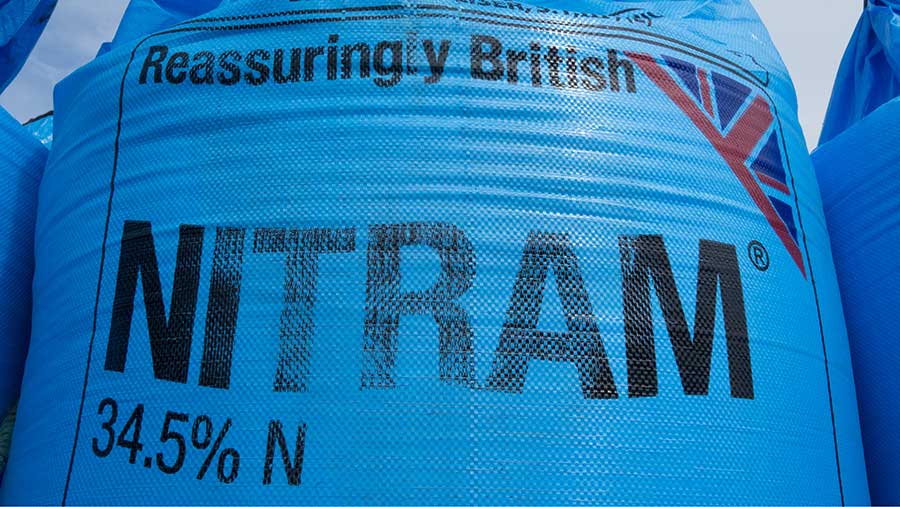CF to halt ammonia production at Billingham and import supply
 © Tim Scrivener
© Tim Scrivener CF Fertilisers is to halt ammonia production at its Billingham site in County Durham because high gas prices have made it uneconomical to produce.
Instead it will import ammonia so it can continue making ammonium nitrate (AN). The company said in a statement late on 24 August that it expects to fulfil all ammonia contracts and all orders of AN contracted for delivery in the coming months.
One national merchant said the announcement created panic among some farmers who thought Billingham was shutting down completely.
“CF have reassured us that AN production will continue with the imported ammonia, so at the moment we are just trying to pass that message back to farmers to put minds at rest that production will continue and all orders will be fulfilled,” said the supplier.
See also: Fertiliser supply tightens as gas price rises further
However, there is concern in the supply trade that relying on imported ammonia could mean CF is able to switch AN production on and off more easily than if it was producing ammonia on site.
The company’s statement said that at current natural gas and carbon prices, CF Fertilisers’ UK ammonia production was uneconomical, with marginal costs above £2,000/t and global ammonia prices at about half that level.
‘Extremely worrying’ move
NFU President Minette Batters said the move by CF Fertilisers was extremely worrying and a sign of the pressure the fertiliser and energy markets were under.
“We will be monitoring any impact this decision has on the immediate fertiliser market and we will be meeting with CF Fertilisers to understand what this suspension means for future fertiliser orders and how long this temporary halting of production is anticipated to last for,” said Mrs Batters.
“The NFU will continue to engage with the government on action to improve the resilience and transparency of the fertiliser market, which is crucial to maintaining and enhancing our domestic food production.”
Carbon dioxide fears
Ms Batters added: “I am also urging the government to review how this decision impacts CO2 availability in the UK, which is essential in the food supply chain to process and package food.”
Production of carbon dioxide, a by-product of the ammonia production process, will cease until the ammonia plant is restarted. CO2 is widely used in food production, and the move by CF is expected to squeeze UK supply. The company said it had notified Billingham’s CO2 contract customers of the stoppage.
Nick Allen, chief executive of the British Meat Processors’ Association, said the closure announcement brought serious concerns for the British meat industry and that the government would have to step in.
“We knew back in June that the closure of CF Industries’ Cheshire plant would leave UK CO2 supplies vulnerable to anything going wrong with their remaining Billingham plant and that we would be heavily reliant on overseas suppliers to make up the shortfall,” Mr Allen said.
“Since then, ammonia producers in Italy and Germany have cut production which sent European food and drink companies scrambling to secure tightening supplies of the gas at the end of July.
“While we are in a much better position now than we were a year ago, if CF Industries follows through on its threat to close Billingham, the British meat industry will have serious concerns.
“Without sufficient CO2 supplies, the UK will potentially face an animal welfare issue, with a mounting number of pigs and poultry unable to be sent for processing.
“It’s for this reason that securing CO2 supplies is of key strategic importance and, following this latest development, we can’t see how government can sit on the sidelines and insist that it’s for companies to work it out among themselves. They are going to need to step in.”
Spiking gas prices
UK wholesale gas prices this morning (Thursday 25 August) went above 600p/therm, then reduced slightly to a level still well above the March peak which followed the Russian invasion of Ukraine.
Supply disruptions and high demand from the EU are pressuring this market. Russia’s Gazprom is planning to cut flows through the Nord Stream pipeline to Germany for three days of maintenance at the end of August, with flows already having been cut to roughly 20% of its capacity. Damage to other pipelines has halted flows elsewhere, while outages at Norwegian and UK gas fields has added to the pressure.
AN production closures
The high gas prices led earlier this week to a slew of announcements of further European AN production cuts as plants are temporarily closed. High AN prices had already led to a move to urea, which is now firming on the back of the reduction in AN supply and a weaker pound.
The date of the temporary shutdown of the ammonia plant has not been confirmed, and CF said it did not expect any impact on employees from this announcement.
